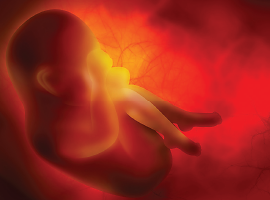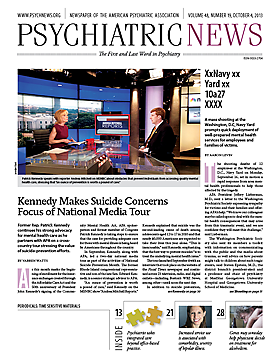Evidence that depression can be transmitted from a pregnant woman to her unborn child was published online August 21 in Biological Psychiatry.
Anqi Qiu, Ph.D., an associate professor of bioengineering at the National University of Singapore, and colleagues evaluated 157 women for depression when they were in the 26th week of pregnancy. The researchers used the Edinburgh Postnatal Depression Scale (EPDS), a 10-item self-report scale designed as a screening instrument for postnatal depression, but which also has been well validated for use in antenatal depression. The EPDS rates the intensity of depressive symptoms during the preceding seven days. Scores of 13 or higher indicate depression. Twenty-eight of the women scored within this range.
After the women’s infants were born, the researchers used structural MRI imaging to evaluate the size of the amygdalae in the infants. They also used a technique called diffusion tensor imaging to determine the microstructure of the infants’ amygdalae. The researchers were interested in evaluating this brain region in the infants because previous research has shown it to be associated with emotion regulation and depression. They reasoned that if maternal antenatal depression had an impact on the amygdala during gestation, it might make the fetus vulnerable to depression after birth.
After taking household income, maternal age, maternal smoking exposure, postconceptual age at brain imaging, and birth weight into consideration, the researchers could find no difference in amygdala volume between the newborns of the 28 women who had been depressed during pregnancy and those of the 129 women who had not been depressed during pregnancy. However, they did find that nerve axons in the right amygdala in the newborns of the depressed mothers were significantly different from nerve axons in the right amygdala in the newborns of the nondepressed mothers. (A similar trend was also found for the left amygdala.)
“Our findings suggest that an increased risk for depression may be transmitted from mother to child during fetal life,” Qiu said in an interview with Psychiatric News. “And together with previous studies of infant behavior, they suggest that screening for antenatal maternal depressive symptoms and intervention programs should begin during the prenatal period.”
“This study adds to the growing literature that demonstrates that untreated maternal depression has potentially negative effects on the developing fetus,” Jennifer Payne, M.D., an associate professor of psychiatry at Johns Hopkins Medical Institutions and an expert on women’s mood disorders, told Psychiatric News. “Many people mistakenly think that depression should not be treated during pregnancy. This study shows that untreated depression is an exposure for the child in the same way that taking a medication is an exposure.”
The research was funded by the National University of Singapore and the Singapore National Medical Research Council. ■

